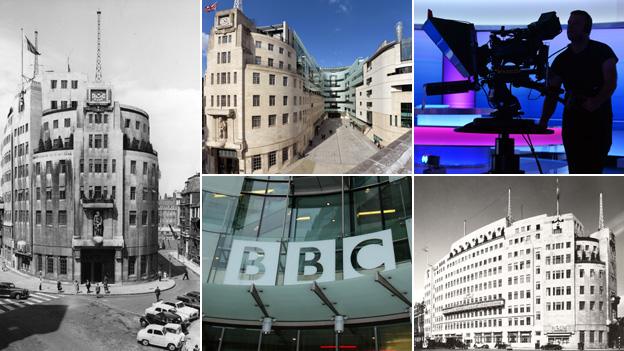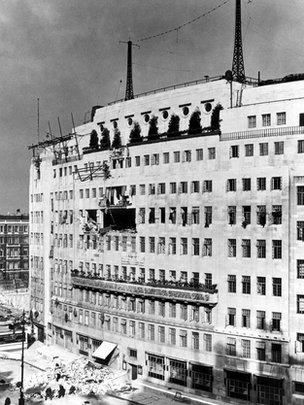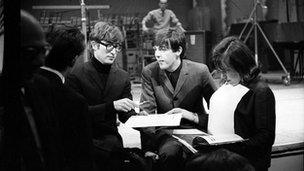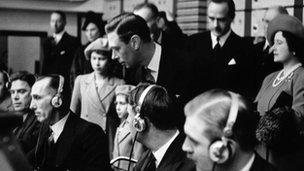The days that defined Broadcasting House
- Published

As the Queen officially opens the BBC's New Broadcasting House in London, here are some of the important landmarks in the original building's history.
Tuesday 15 March 1932
The BBC had already been in existence for a decade as a radio service, first as a commercial company and from 1926 as a public corporation, when it moved to its new headquarters in central London.
Robert Seatter, head of BBC history, on the 'magic and metaphor of BH'
The corporation's first director John (later Lord) Reith had no doubt about the importance of the radio, commenting: "This is the most powerful weapon in the world and it's in my hands."
The transfer of staff and programmes from the BBC's Savoy Hill base took some time. On 15 March Henry Hall and his BBC Dance Orchestra performed the first music programme to come from BH, followed three days later by the first regular news bulletin from what the London Evening Standard newspaper called the "new wonder home of the BBC".
And on 2 May 1932, Reith welcomed BBC staff to the new purpose-built building, which he had described as "the centre of the world".
Tuesday 4 January 1938
Following the chimes of Big Ben and an introduction by Lord Reith, presenter Ahmad Kamal Sourour Effendi, who had been recruited from the Egyptian radio service, introduced the corporation's first foreign language broadcast, in Arabic.
Today, the BBC World Service provides services in 27 languages as well as English. In 2012, the BBC's global weekly audience, on radio, television and online, was estimated at 239 million.
Tuesday 18 June 1940
As the French government prepared to sign an armistice with the Nazi invaders, General Charles de Gaulle, who had escaped in a British aircraft, broadcast on the BBC to France.
In his speech, the general called upon "all Frenchmen who want to remain free to listen to my voice and follow me. Long live free France in honour and independence."
De Gaulle returned to his country following the allied invasion of June 1944 and served, initially as prime minister, and later, as the first president of the Fifth Republic, from 1959 to 1969.
Tuesday 15 October 1940

Damage at BH following the bomb explosion of 15 October 1940
World War II saw Broadcasting House on the front line, literally as well as journalistically.
While reporters like Richard Dimbleby and Wynford Vaughan Thomas brought the conflict into people's front rooms via the wireless, BH found itself on the receiving end of a number German air attacks.
At 20:05, the building took a direct hit from a 230kg delayed-action bomb which destroyed the switchboard before exploding 58 minutes later, killing seven members of BBC staff.
Bruce Belfrage, who was reading the nine o'clock news, famously continued speaking with barely a pause, so as not to alert anyone listening in to the explosion, a moment which he re-created in 1950.
Sunday 27 May 1951
The BBC Radio Theatre hosted a recording of a new comedy series, provisionally entitled Crazy People, later to become The Goon Show.
Starring Spike Milligan, Harry Secombe, Peter Sellers and Michael Bentine - who left after the second series - the programme's surreal creativity broke the mould of British comedy. Though the recording of that first programme no longer exists, Michael Bentine later recalled one of those first sketches.
Though their regular shows ceased after an episode entitled The Last Smoking Seagoon in January 1960, they performed The Last Goon Show of All, before an audience which included the Duke of Edinburgh and the Princess Royal, in October 1972.
Monday 25 January 1954
Under Milk Wood was a "play for voices" by the Welsh poet Dylan Thomas, who had died in New York City on 9 November 1953.
His death shocked his friend, the actor Richard Burton, who agreed to play First Voice in the radio play, produced by Douglas Cleverdon, with all fees and royalties going to Thomas's widow Caitlin and her children.
As Melvyn Bragg put it in his book Rich: The Life of Richard Burton, "The voice is an elegy for his own past, for his dream of Wales and for his own hero, a poet, dead of drink."
Saturday 16 March 1963

John Lennon and Paul McCartney during rehearsals for Saturday Club, December 1963
Although they had already featured in a number of BBC programmes, this was The Beatles' first visit to Broadcasting House.
They performed six live songs - including Please Please Me and I Saw Her Standing There for Saturday Club - presented by Brian Matthew - in a year which saw the birth of "Beatlemania" in the UK prior to their breakthrough in the United States.
Altogether, the group played on 53 different BBC radio shows between March 1962 and June 1965.
Over the years, BH has played host to "all of the great writers from Bernard Shaw, to Harold Pinter through to Beckett, pop music, and every major politician of the day," says the BBC's official historian, Prof Jean Seaton of the University of Westminster,
Saturday 30 September 1967
One of the most momentous days in British broadcasting saw the demise of the BBC Home Service, the Light Programme and the Third Programme and the birth of Radios 1, 2, 3 and 4.
Disc jockey Tony Blackburn opens Radio 1 on 30 September 1967.
Radio 1, the corporation's answer to the highly popular but illegal pirate radio stations, launched at 07:00 when Tony Blackburn, himself a former pirate radio DJ, played the single Flowers In The Rain by The Move at the start of his Daily Disc Delivery programme.
Wednesday 16 January 1991
As coalition troops moved into Iraq at the start of Operation Desert Storm, the BBC decided to broadcast extensive live coverage of the conflict via a new station, BBC Radio 4 News FM. It was eventually on air for 17 hours a day, seven days a week.
The station was the brainchild of Jenny Abramsky, the then head of radio news and current affairs, who described it as "the essence of public service".
Although the station terminated on 2 March 1991, when a ceasefire was called, Radio 4 News FM signalled the birth of continuous rolling news coverage at the BBC.
Tuesday 19 June 2012
The Burmese politician and human rights activist Aung San Suu Kyi visited BH.
She paid tribute to the BBC World Service for "keeping her in touch" during her years of house arrest in Burma and broadcast an interview with the BBC Burmese Service.
See more pictures of the visit on the About the BBC photostream, external on Flickr.
Friday 7 June 2013

The Queen visited BH as a young girl with her parents in March 1939
In a sense, the Queen's visit to officially open New Broadcasting House brings the wheel full circle.
Her grandparents, King George V and Queen Mary, toured the newly-opened BH in July 1932, just weeks after broadcasts began.
Friday marks her sixth visit to Broadcasting House, most recently in 2006 when she inspected the building's extensive renovation work.